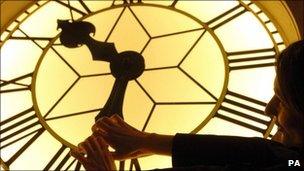UK clocks change trial being considered
- Published
- comments

Supporters say lighter evenings would reduce traffic fatalities and boost exercise
The government is considering moving the UK's clocks forward by an hour for a three-year trial period.
Ministers are writing to counterparts in Scotland, Wales and Northern Ireland to seek a UK-wide consensus on a trial.
It would see the UK adopt Central European Time, with BST plus one hour in summer and GMT plus one in winter.
But a spokeswoman for the Scottish government said its "established position" was that there was "no case for a change to existing arrangements".
'Double summertime'
If adopted, the change would mean that for one autumn, the clocks would not go back, synchronising the UK with much of Europe and meaning that British Summer Time (BST) would effectively continue throughout the winter.
The following spring the clocks would go forward to BST plus one hour, or two hours ahead of Greenwich Mean Time (GMT) - something which has been called "double summertime".
The move is a response to the Daylight Savings Private Members' Bill, external put forward by Conservative MP Rebecca Harris.
It calls for a review of the potential costs and benefits of advancing the clocks by one hour, and if the review recommends it, a trial period.
Ms Harris told BBC2's Daily Politics her bill was about "moving an extra hour of daylight from the morning when a lot of us waste it in bed to the evening when we can actually get out and enjoy it and do things after school and work".
Advocates of a change cite a range of benefits to lighter evenings, including promoting sports and exercise and reducing energy consumption.
But for years the case in favour of change has struggled because of opposition in Scotland where it would leave some northern-most areas without daylight until 10am during the winter months.
Critics say this would make the lives of outdoor workers harder and increase road accidents. Northern Scotland saw a net increase in the number of people killed or seriously injured during a trial from 1968 to 1971.
Rebecca Harris MP and Peter Hitchens disagree on whether Britain should move to European time
Mail on Sunday columnist Peter Hitchens told the Daily Politics it was not just a problem for Scotland.
"It's not just Highlanders and milkmaids who are going to suffer when this comes in, it's absolutely everybody.
"We'd all in England have breakfast in the dark. Then in the summer it twists the other way so you'd be watching Newsnight and it'd be light outside."
The government opposed Ms Harris's bill when it had its second reading last December on the grounds that it made no provision for consultation with Scotland, Wales and Northern Ireland.
But the Department for Business is now tabling amendments relating to the devolved nations which it says will allow Westminster to support it.
Business Minister Ed Davey said it was "only right that we at least look at what the potential economic and social benefits of any change might be".
Prime Minister David Cameron said that "as someone who like playing sport" he had "always been interested in this debate".
"But I've always felt you could only do this as a United Kingdom and there have always been very strong arguments made in Scotland," he said.
'Absolute veto'
A spokesman for the Scottish government welcomed the commitment to consult the devolved administrations formally but added: "The Scottish government's established position is that there is no case for a change to existing arrangements."
And SNP MP Angus MacNeil said any change would have "massive implications for the safety and wellbeing of everyone living north of Manchester".
"It is no secret that Tories in the south want to leave Scotland in darkness, but fixing the clocks to British summertime would mean that dawn wouldn't break in Scotland until nearly 9am," he said.
But Scotland's farming lobby, NFU Scotland, said while it was "nervous" about the potential impact, the time was right for a full, independent analysis.
According to Whitehall sources, the Scottish government will get an "absolute veto" on the proposals.
That has annoyed the Conservative MP Tim Yeo, chairman of the Commons energy and climate change committee who tabled a bill in 2007 aimed at getting the clocks moved forward by one hour.
He said: "It's feeble to say that this change is the right thing to do but they will only do it if Scotland says yes. This is far too important an issue to allow the Scottish tail to wag the British dog."
The Welsh government said it would respond shortly to the UK government's correspondence, adding: "Given the impact of any change to the current system, it is important that all factors are taken into account."
The clocks were moved forward by an hour during World War II to maximise productivity at munitions factories and ensure people got home safely before the blackout.
Following the 1968 to 1971 trial, when BST was employed all year round, a White Paper said it was impossible to quantify the advantages and disadvantages of the move.
- Published28 October 2011
- Published27 February 2011
- Published24 February 2011
- Published29 October 2010